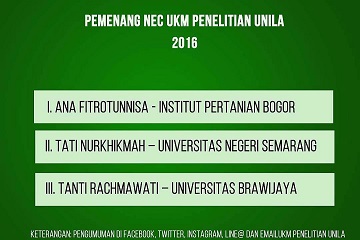SNI Food Lovers, the Ideas of IPB Student for the Solutions of MSME Development

The SNI (Standar Nasional Indonesia = Indonesian national standard certification) is a standard that must be complied with for certain designated goods, services, systems and processes in Indonesia. The affixing of the SNI marking on the product or service is an indication that it meets the standard requirements to allow the product to be sold in Indonesia. The Directorate of Food Product Standardization is one of five existing technical implementing units in the Deputy for Food Safety and Hazardous Substance Control of the National Agency of Drug and Food Control (POM = NA-DFC). As stipulated in the Decision of the Head of POM Number 02001 / SK / KBPOM dated 26 February 2001, the Directorate of Food Product Standardization has to process steps for developing a policy development, the preparation of guidelines, standards, criteria and procedures, and implementation of controls, technical guidance and evaluation in the field of regulation and standardization food products.
The fact that most local food products are produced by Micro, Small and Medium Enterprises (MSMEs), special attention should be given to establishing whether a quality defect relates to falsification of those local products. National Widyakarya Food and Nutrition (WNPG) IX Year 2008 shows problems on food safety of food products produced by SMEs, which are unmatched to the national standard. They are really need to be addressed, especially to quality of human resources, use of Food Additives (BTP) and hazardous chemicals that are prohibited for food, as well as inadequate facilities and technology.
In responds for such inadequacies and unmatched standards, it is deemed necessary to improve the professional performance of those local producers of food products by the empowerment program for MSMEs throughout Indonesia. The empowerment of SMEs begins by strengthening of food control infrastructure. Measures can be taken for the strengthening resilience for food security and nutrition, of UMKM food security, for example by providing technical assistance to the local government, increasing the number and competence of inspectors, extension workers and food safety advocates, and empowering local resources. After strengthening the construction of UMKM food security, the next step will be best practice guidance for successful MSMEs.
Therefore, it is necessary to increase investment such as improving skills of human resources according to the specific business of UMKM, improving business processes fulfill compliance requirements, and communicate risk with institute builder. After the implementation of the two aspects, they will enhance the global competitiveness of innovative SMEs, which is characterized by safe and quality products, meet global market requirements, and effects of trust and risk perceptions on consumer acceptance. Ultimately, the empowerment of MSMEs is expected to improve the local economy and expand employment.
Many MSMEs talk of quality as an advertising and sales gimmick but without seriously addressing quality issues. Quality is defined in standards and therefore one can only fully understand the quality attributes of a product such as durability, palatability, compatibility, performance, safety, suitability for use, and others if one acquires and implements the relevant standards. Finding the right standards for business can be a challenge. Implementing standards inspires confidence in our business and sets us apart from the competition. And, crucially for our bottom line, it can drive down costs, boost productivity and improve profits. However, the need for a special strategy to promote the local products with SNI labels the correct choice, but it is rather difficult. This problem seems to have attracted the attention of Ana Fitrotunnisa, students of the Department of Mathematics, Faculty of Mathematics and Natural Sciences (MIPA), Bogor Agricultural University (IPB) who are very concerned about SMEs. This student has several times won the national level essay competition with the theme of concern for the development of UMKM. The strategy gave her the MSME problem is with SNI Food Lovers. This idea she presented in an essay competition at the University of Lampung successfully brought her into the first winner of the national level.
SNI Food Lovers is a strategy that includes standardization and labeling of UMKM products that have been standardized. The main definition of SNI Food Lovers is standardization and labeling. Legal requirements for product packaging and labeling is important advice for standardized products. This label is a sign that the MSME product has been standardized. The new label will make it easier for consumers to make better informed food choices, will affect the level of public acceptance.
The second definition of SNI Food Lovers is a program to advocate of supporting local businesses and local products through the standardization policy for all SMEs products in Indonesia. Collaboration between the definition of SNI Food Lovers and related parties will make the MSME sectors are growing at a faster rate to produce competitive products. The MSME sector in Indonesia is highly heterogeneous in terms of the size of the enterprises, variety of products and services, and levels of technology. It complements large industries as ancillary units and contributes enormously to the socioeconomic development of the country. Especially to realize Indonesia gold 2045. (Wied)



